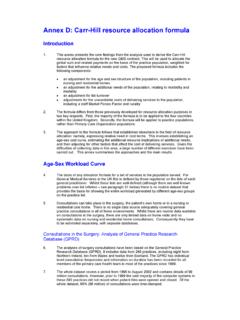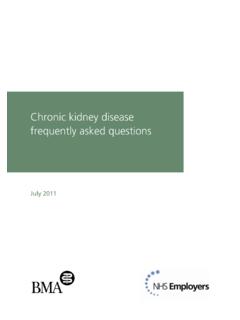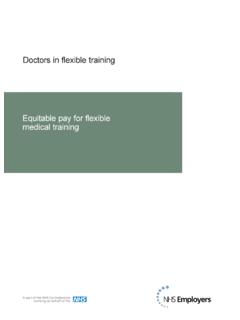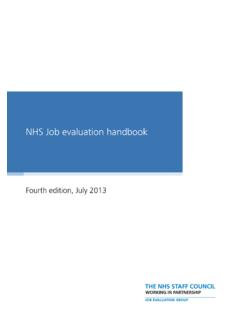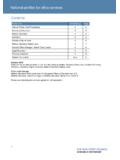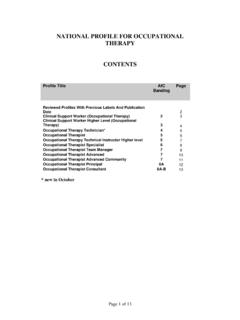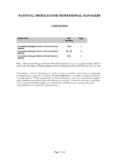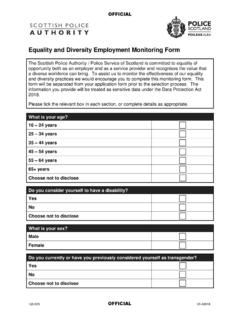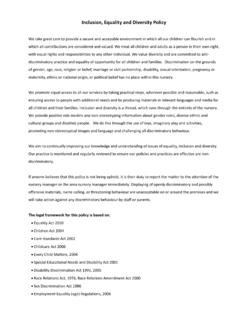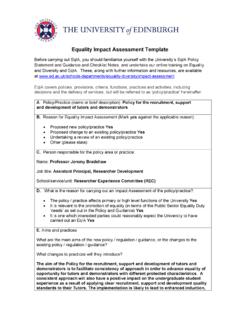Transcription of Work health assessments 10 July - NHS Employers
1 work health assessments july 2013 About the NHS employment Check Standards 2 This document outlines the work health assessments that NHS organisations (across England) are required to undertake in the appointment and ongoing employment of individuals in the NHS. It is one of a set of six documents that make up the NHS employment Check Standards. The NHS Employers organisation has developed these standards with the Department of health and Employers in the NHS. The standards, last updated july 2013, include those that are required by law, those that are determined by Department of health (DH) policy in relation to compliance with the Government s core standards outlined within the Standards for Better health , and those required for access to the NHS Summary Care Record (SCR). All NHS providers (including NHS organisations and private providers) are required to be registered with the Care Quality Commission (CQC) and, as part of this registration, are required to comply with the health and Social Care Act 2008 (Regulated Activities) Regulations 2010 and the Care Quality Commission (Registration) Regulations 2009.
2 The CQC's Essential Standards of Quality and Safety outline 16 core standards which must be met, including having robust recruitment practices in place (Outcome 12: Requirements relating to workers, specifically refers). NHS providers should therefore provide evidence of compliance with the NHS employment Check Standards as part of the CQC's annual regulatory framework. Failure to comply with these standards could potentially put the safety and even the lives of patients, staff and the public at risk. The NHS employment Check standards apply to all applications for NHS positions (prospective employees) and staff in ongoing NHS employment . This includes permanent staff, staff on fixed-term contracts, volunteers, students, trainees, contractors NHS, highly mobile staff, temporary workers (including locum doctors), those working on a trust bank, and other workers supplied by an agency.
3 Trusts using agency, contractor or other external bodies to provide services must ensure, through regular audit and monitoring, that their providers comply with these standards. Avoiding discrimination Under the Equality Act 2010, Employers must not unlawfully discriminate in their recruitment processes on the grounds of ethnicity, disability, age, gender or gender re-assignment, religion or belief, sexual orientation, pregnancy or maternity, or marriage or civil partnership. To avoid discrimination, Employers must treat all job applicants in the same way at each stage of their recruitment process. Recording and protecting data NHS Employers must carry out all checks in compliance with the Data Protection Act 1998. Information should only be obtained where it is absolutely essential to the recruitment decision and kept in accordance with the Act.
4 Employers must record the outcome of all checks undertaken, using the Electronic Staff Record (ESR), where available, or an alternative HR management system. These checks form part of the information governance and assurance standards linked to the use of the NHS Summary Care Record (NHS SCR). For more details, visit the health and Social Care Information Centre: 3 Introduction 4 Minimum requirements 4 Exceptions 5 The process 6 Responsibilities 6 Risk assessment 7 Making reasonable adjustments 7 Keeping and transferring occupational health records 8 Withdrawal of appointment 8 Appendix 1.
5 Legislative requirements 9 Equality Act 2010 9 Further information 14 Contents work health assessments June 2013 4 Introduction All NHS staff must have a work health assessment (sometimes referred to as a pre-placement health assessment ), that adheres to equal opportunities legislation and good occupational health practice. The purpose of a health assessment is to assess whether new employees: have a health condition or disability that requires adjustments in the workplace to enable them to undertake the post offered; or have a health condition or disability that requires restrictions to their role ( Exposure Prone Procedures (EPP) workers with a blood-borne virus). All work health assessments must take into account the requirements of the disability provisions within the Equality Act 2010 and reasonable adjustments must be made to ensure that people can work in the NHS regardless of physical impairment or learning disabilities.
6 A health assessment must only be made once a job offer has been made. Employers must make it clear to prospective employees that any offer of appointment is conditional pending the successful completion of pre- employment checks, including a health assessment . work health assessments are only one of six employment check requirements that Employers must undertake, as outlined in the NHS employment Check Standards. Please refer to the other documents in the standards for information on verification of identity, right to work , professional registration and qualification, employment history and reference, and criminal record and barring checks. Minimum requirements The changes which came into effect from 1 October 2010 under the Equality Act (Section 60 of the Act refers) were aimed at restricting the circumstances when an employer can ask questions about an individual's disability or health prior to them being offered employment (whether this be a conditional or unconditional offer of employment ).
7 In practice, this means that it is unlawful to ask any such questions as part of your application process or during interview, except in certain exceptional circumstances (see section on exceptions below). This also includes referring the applicant to an occupational health service, or asking them to fill in a pre- employment health questionnaire (PEHQ) provided by an occupational health professional prior to any offer of employment being made. work health assessments June 2013 5 Employers should no longer issue applicants with PEHQs as part of the interview process, except in exceptional cases. In their place, Employers should invite prospective employees to indicate which of the following two statements apply to them tick either statement A or B: A. I am not aware that I have a health condition or disability that might impair my ability to undertake effectively the duties of the position that I have been offered.
8 B. I do have a health condition or disability that might affect my work and may require special adjustments to my work or my place of work . These two statements should be included as part of the letter issued by Human Resources outlining their conditional offer of appointment. The changes outlined within the Equality Act 2010 do not make any amendment to requirements for health care workers involved in Exposure Prone Procedures (EPP), patient care, patient contact, or body fluid sample handling. Specific additional pre-placement screening for these groups of staff should be relevant to the job hazard and risk profile and must be undertaken in accordance with relevant guidance. See further guidance on Public health England's website at: Some NHS providers may choose to undertake supplementary screening that meets their local needs.
9 However, this must be undertaken in accordance with the Equality Act 2010, as outlined above. Further guidance can be found at: Exceptions The exceptions to the ruling around what questions can be asked prior to any offer of employment are more fully outlined in Section 60 of the Equality Act 2010, but in summary this includes where Employers need to ask questions for the sole purpose of: ascertaining whether reasonable adjustments are necessary as part of the interview process to allow ease of access to the building or interview room, or asking questions to establish whether the individual may have any special needs to enable them to undertake an assessment as part of the interview process ascertaining whether the applicant can carry out a function which is intrinsic to the job being applied for.
10 Including asking a specific disability or health related question which would determine whether or not such a person could carry out this function with reasonable adjustments in place any question asked must be relevant to the position being offered taking positive action in relation to disabled people for instance asking questions which ask if a person is disabled so they can benefit from any measures aimed at improving disabled people s employment rates. It is essential that you make absolutely clear to the applicant that any such questions are targeted as ascertaining eligibility for schemes which are targeted at helping people with disabilities work health assessments June 2013 6 where you can legitimately demonstrate that a job has an occupational requirement for a person with a specific disability or impairment, then you may ask about a person s health or disability to establish that the applicant meets those requirements monitoring diversity any data obtained as part of any monitoring process should be collected and recorded separately from any application.
